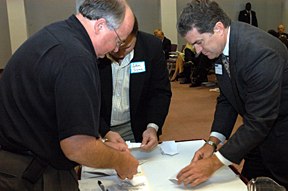Posted: 10/29/04
|
 |
| Wesley Shotwell of Azle, vice chairman of the BGCT Executive Board, responds to criticisms of proposed changes in governance. |
Charles Davenport of Tulia urges the Executive Board to send the governance proposal back to committee for one year. |
Executive Board recommends changes in
governance; rejects efforts to postpone
By Marv Knox
Editor
The most significant reorganization of the Baptist General Convention of Texas in five decades has cleared another hurdle.
Meeting in a called session Oct. 26, the BGCT Executive Board approved amendments to the convention's constitution that define how the BGCT governs itself.
Messengers to the BGCT annual session will consider the reorganization when they meet in San Antonio Nov. 8-9. To take effect, the changes must be approved at both the 2004 and 2005 annual sessions.
The Executive Board voted 81-28 to amend the constitution after a motion to delay the process for a year failed 38-59.
The Executive Board previously approved a set of mission, vision, values and priority statements at its regularly scheduled fall meeting Sept. 28. But board members asked for more time to think about reorganizing the convention's structure.
The reorganization would decrease the size of the Executive Board from 234 members to less than 100.
Currently, each of the BGCT's 114 affiliated associations has at least one member on the Executive Board. The new system would divide the state into 30 geographical sectors of 52,000 resident church members. Each sector would get three board members.
The reorganization also would eliminate the convention's two coordinating boards, which act as liaisons to the BGCT's schools and human-welfare ministries; its two commissions, which give direction to Executive Board staff programs; and the Administrative Committee, which serves as the convention's finance, personnel and review committee.
 |
| Glen Schmucker, pastor of Cliff Temple Baptist Church in Dallas, Anthony Sisemore, pastor of First Baptist Church in Floydada, and David Nabors, BGCT chief financial officer, count executive board votes on a governance proposal. The plan passed. |
Those functions would be assigned to committees of the new Executive Board, which would meet for two days three times a year.
Opponents and others who expressed reservations about the governance changes cited several problems with the proposals.
Executive Board Vice Chairman Wesley Shotwell, a member of the team that drafted the revisions, responded to the three major issues:
 Reduction of the Executive Board's size.
Reduction of the Executive Board's size.
“The Executive Board is legally responsible and potentially liable for litigation,” said Shotwell, pastor of Ash Creek Baptist Church in Azle. “Those who are legally liable for the decisions and policies of the organization must be well-informed and influential in the development of those policies.”
But a 234-member board cannot perform those tasks and “cannot govern effectively,” he added.
“We now have as many as a dozen committees and commissions … with no real connection to the Executive Board, who have the power to make decisions but have no legal responsibility. The Executive Board has the legal responsibility but no real opportunity to make informed decisions.”
Noting some Texas Baptists have expressed concern over decreased “participation” through a smaller board, Shotwell countered: “We must redefine what it means to be on the Executive Board–that its purpose is not for participation, but that its purpose is for governing. … Participation should not be measured by how many people are involved in governance. Participation should be measured by how many people are involved in ministry and missions.”
Responding to a concern that a smaller Executive Board will make the convention “less inclusive,” Shotwell pledged, “We will be intentionally more inclusive of some groups who have not been fairly included in the past.
“Even though there will be a smaller number of people, (the board) will be inclusive of a broader range of Texas Baptists.”
 A change in representation, from a system that highlights associations to one built upon resident church membership.
A change in representation, from a system that highlights associations to one built upon resident church membership.
“Executive Board members are not delegates from associations or churches, nor do they represent the interests of their geographical region,” Shotwell said.
He warned against “connectionalism” and “violating traditional Baptist polity” if the convention were to codify representation by associations.
The strategic planning committee focused on providing a mechanism for reflecting a cross-section of Texas Baptists on the Executive Board, he noted, predicting a new board with representation based on resident membership according to counties would break down the “systemic barriers that still prevent us from reaching our goals of inclusion.”
Acknowledging Baptists in West Texas and other rural areas worry about losing their voice on the board, Shotwell said the percentage representation on the new Executive Board would be very close to current representation.
For example, members from the Panhandle, South Plains and West Texas would comprise 10 percent of the new board, while members from those areas reflect 11.5 percent of the current board.
 Consolidation of power within the Executive Board when the coordinating boards and commissions are eliminated.
Consolidation of power within the Executive Board when the coordinating boards and commissions are eliminated.
“If the Executive Board is legally responsible, it needs to have the ability to make informed decisions,” Shotwell maintained.
The new structure would enable the Executive Board to work more closely with the BGCT's institutions and “give those who have the responsibility the ability to discern the right course of action.”
Pointing to concerns that the BGCT Christian Life Commission's effectiveness could be reduced, Shotwell said: “No one wants to endanger the Christian Life function of being a prophetic voice to Texas Baptists. … It is our conviction that there is no provision in the current proposal that will endanger this role.”
The proposal also streng-thens the CLC's ability to speak “for” Texas Baptists, he added.
After Shot-well's presentation, Executive Board members discussed the proposed reorganization, and some clearly indicated they did not agree.
“Things need to be changed, but this is not it,” said Van Christian, pastor of First Baptist Church in Comanche.
While the Executive Board needs more involvement and a balance between responsibility and accountability, “I do not accept that these proposals do that,” Christian said.
Also, reduction in the size of the board will diminish its representative nature, he contended. He illustrated by noting his association now has a board member, but if the reorganization passes, three members will represent 14 associations.
Charles Davenport, pastor of First Baptist Church in Tulia, added, “My concern is what the perception is going to be across the state.”
For example, some people have responded negatively because they don't understand the reorganization, and some feel the process has been “rushed,” he said, noting he was “concerned for diminished participation.”
Board members need to “distinguish between 'participation and governance' and 'participation in governance,'” pleaded David Keith, pastor of Carlton Baptist Church in Carlton. “What we're doing is decreasing 'participation in governance.'”
Keith offered a “friendly amendment” to require that at least 40 percent of the Executive Board be comprised of men, women, Anglos, non-Anglos, members of smaller churches with membership under 100 and members of larger churches.
Rudy Camacho, lay member of Iglesia Bautista Genesis in Fort Worth, affirmed that idea. “I'm thinking of people who think they're forgotten out in West Texas,” he said. “This will enhance the opportunity of those to serve who do not presently serve.”
Board members debated the merits of including the percentage requirement in the constitution. Some said the requirement is necessary to guarantee fair participation by all groups, while others said such measures should be featured in bylaws, not the constitution.
Eventually, the board approved a related amendment, which removed the percentage requirement but added “large and small churches” to a statement that says, “The membership of the Executive Board shall be generally representative of the Baptist membership in the convention and shall include men and women, Anglo and non-Anglo persons, and those who have abilities and experience needed by the board.”
Davenport asked the board to delay the issue for a year. His suggestion would have referred the recommendations back to the strategic planning committee that offered them and authorized the Executive Board chair to supplement the committee with other members. Then that group would re-examine the issue, report to the churches and provide a follow-up proposal in time for the BGCT to act on it in 2005.
“People back home don't understand it,” Davenport said of the current proposal.
“Not only do we need to be clear; we need to bring people along with us.”
“My greatest fear is this is not ready to go to the convention,” echoed Ron Bowles, minister of worship and communications at First Baptist Church in El Paso.
But Bill Skaar, pastor of First Baptist Church in Grand Prairie, predicted no end to the postponement, once it is started. "The changes are needed," he said, comparing current expectations of the board to a "giant church council that is asked to put a stamp on what others have done."
Time for change is running out, added Glen Schmucker, pastor of Cliff Temple Baptist Church in Dallas. “Those who are 40 years and younger won't care any more about this a year from now than they do now,” he said, stressing that young adults see the convention as irrelevant and need to see the convention responsibly handling change.
Hugh Tyree, a lay member of Park Central Baptist Church in Dallas, suggested, “We ought to pass this today but ask our leadership to … come up with another plan to allow more people to participate.”
Randall Scott, pastor of Immanuel Baptist Church in Paris, pleaded for postponement. “West Texas people cannot afford to be disenfranchised. Neither can East Texas or anyone. I believe we're on the right track, but we need to do some refining before we offend people, drive people away.”
The proposal is a responsible action in light of the Executive Board's legal liability, stressed Steve Wells, pastor of South Main Baptist Church in Houston.
Besides, the convention needs to change to demonstrate its value to younger adults, he said. Noting only five members indicated they are younger than 40, he said: “This structure is seen as irrelevant to people under 40. They will not become more active merely by getting older.”
The vote to delay for a year failed, and then the overall proposal passed.
BGCT President Ken Hall explained the proposals sprang from “the outcry of younger pastors for changes in the way Texas Baptists do their work.”
The proposals arrived through established channels, took nearly a year to develop and involved Texas Baptists representing all ages and ethnicities, men and women, clergy and laity, and small and large and rural and urban churches, Hall said.
“The purpose was to use the processes and not rush to conclusions,” he added.
“This is only one step of many,” he said, noting amending the constitution requires two years and changes cannot be implemented until after the BGCT meets in 2005.
“We'll come back with bylaws and core strategies,” Hall reported. “The intention is to use as much of the breadth and width of our convention as possible to bring changes.”
He stressed the intention of the changes is to be inclusive, not exclusive. “Nothing was done in a back room; everything was done in the open,” he said. “Every meeting we held was covered in detail by the Baptist Standard. …
“We're a family, and we're about kingdom business. God wants us to go beyond anything we could dream for ourselves. The important thing is that we do God's business with his mind and his heart.”
News of religion, faith, missions, Bible study and Christian ministry among Texas Baptist churches, in the BGCT, the Southern Baptist Convention ( SBC ) and around the world.




